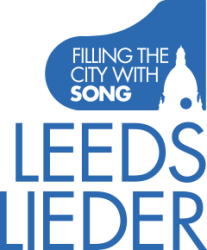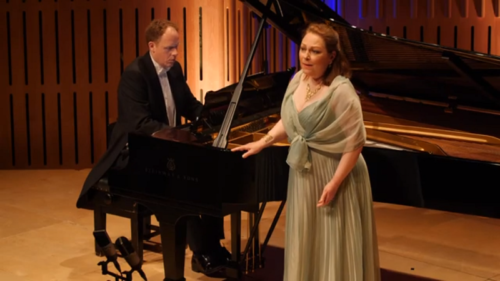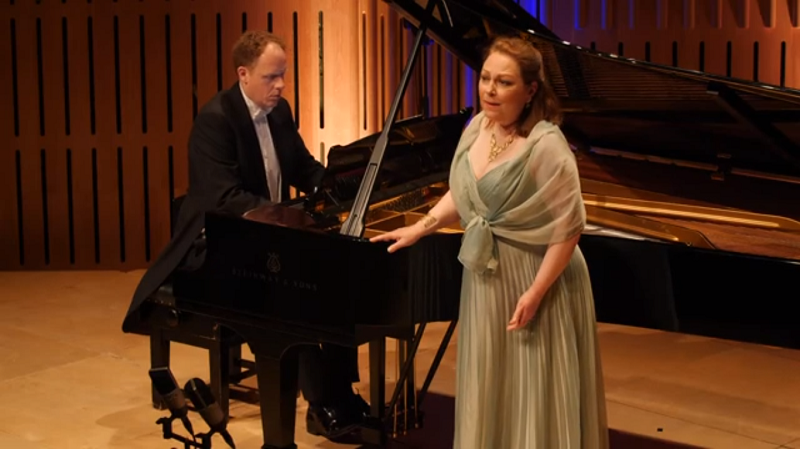
 United Kingdom 11th Leeds Lieder Festival Opening Gala Recital: Dorothea Röschmann (soprano) and Joseph Middleton (piano). Livestreamed (and now available on YouTube) from Howard Assembly Room, Leeds, 28.4.2022. (JPr)
United Kingdom 11th Leeds Lieder Festival Opening Gala Recital: Dorothea Röschmann (soprano) and Joseph Middleton (piano). Livestreamed (and now available on YouTube) from Howard Assembly Room, Leeds, 28.4.2022. (JPr)

Robert Schumann – Gedichte der Königin Maria Stuart: ‘Abschied von Frankreich’; ‘Nach der Geburt ihres Sohnes’; ‘An die Königin Elisabeth’; ‘Abschied von der Welt’; ‘Gebet’
Mahler – Des Knaben Wunderhorn: ‘Rheinlegendchen’; ‘Das irdische Leben’; ‘Wer hat dies Liedlein erdacht?’; ‘Lob des hohen Verstandes Verlorne Müh’; ‘Wo die schönen Trompeten blasen’
Wolf – Lieder der Mignon: ‘Heiss mich nicht reden’; ‘Nur wer die Sehnsucht kennt’; ‘So lasst mich scheinen’; ‘Kennst du das Land’
Wagner – Wesendonck–Lieder: ‘Der Engel’; ‘Stehe still!’; ‘Im Treibhaus’; ‘Schmerzen’; ‘Träume’
The gap in the musical landscape provided by the relatively few opportunities to hear the art-song repertoire in live performance outside London was the inspiration for Leeds Lieder which was founded in 2004 by Jane Anthony in partnership with a group of individuals and Leeds College of Music.
A number of Festivals, other concerts and masterclasses followed and – cutting this consideration of their significant achievements necessarily shorter than I would wish – in 2014 the pianist Joseph Middleton was appointed Director of Leeds Lieder. For 2022 he has curated a festival titled ‘Song Illuminated’ which he introduced by writing in the programme how: ‘Song, the artform we all love, illuminates so much of what we experience in life and through its inexplicable magic also illuminates so much of ourselves, to ourselves. The great poets and composers we celebrate and champion at Leeds Lieder prove themselves over and over to be our wisest companions as they cast light upon much of what it means to be human. Through them, connections between mankind and nature are shown in radiant relief. The environment, nature, rebirth, how song illuminates our lives and the beauty of the earth are themes that run through the 2022 Leeds Lieder Festival and it has been the biggest joy putting this Festival together for you all.’
Across the years I have had a love-hate relationship with Lieder and their performance and – there is no one to blame but myself – only certain composers have produced songs worthy, to me, of repeated hearing; others can be more of an acquired taste. Lieder recitals are much of a muchness with the same works programmed time and again – and this gala evening was no exception – so it is remarkable audiences will return in such numbers to hear familiar ones. However, if Leeds Lieder – as they probably do – can indeed draw in some newcomers to the artform then that is to their eternal credit.
There was little that was unique about Dorothea Röschmann’s short recital of Robert Schumann, Mahler, Wolf and Wagner (it’s not entirely clear why an interval was deemed necessary but that can be skipped through on YouTube). It was basically serious stuff and could have benefitted from greater contrast in the selection of songs. Röschmann began with some late Schumann and his bleakly confessional Gedichte der Königin Maria Stuart and quickly established the serious mien she was to bring to all she sang and a soprano voice – as heard through my loudspeakers – more comfortable, at least initially, in her mezzo range. Based on letters attributed to Mary, Queen of Scots – they probably cover more than two decades of her life – we identity with Mary bidding farewell to her adopted land of France; as a concerned mother she hopes her son will be protected; she wishes to meet her rival Elizabeth I; she accepts death; and then there is Mary’s final prayer as her execution draws near. Röschmann sang these with conviction and revealed – in her adversity – all Mary’s regret, stoicism, and sense that right was on her side. Middleton’s rather bright sounding Steinway provided adequate support without him reaching the expressive heights I have heard from others.
A selection from Mahler’s Des Knaben Wunderhorn was sung next and Röschmann chose five of the most popularly performed ones with Middleton proving rather restrained throughout once again. ‘Rheinlegendchen’ seemed a little high for Röschmann and we really never heard, at least I didn’t, the distinction between the sweetheart who craved affection and the encounter of the King and Queen with a ring. However in ‘Das irdische Leben’ Röschmann brought out all the doomed child’s desperation for food. For ‘Wer hat dies Liedlein erdacht?’ there was some good vocal control and then more of a sense of fun for ‘Lob des hohen Verstandes Verlorne Müh’ and the debate on intellect between a Cuckoo, Nightingale and Donkey. There were moments when her top voice was under stress and I am surprised to see she still sings Ariadne and Elisabeth (Tannhäuser). Middleton came more into his own with a haunting illusion to the distant trumpet of ‘Wo die schönen Trompeten blasen’ and there was some good storytelling from Röschmann as the ghost of a dead soldier revisits his girlfriend.
As to who Goethe’s Mignon is, Richard Stokes’s programme note tells us, ‘She’s a 13–year–old Italian girl who has been kidnapped in Italy by a troupe of actors and brought to Germany. In ‘Heiss mich nicht reden’ Mignon is hanging on to the secrets of her past and ‘Nur wer die Sehnsucht kennt’ is about the man she loves who is far away. These songs are intense with much underlying angst. Röschmann made ‘So lasst mich scheinen’ more reflective as Mignon is seeking release from her suffering and for the singer and her accompanist an emphatic ‘Kennst du das Land’ – as Mignon is longing for her homeland – revealed a greater sense of partnership than seen and heard hitherto and so this was one of the highlights of this concert.
The Wesendonck-Lieder is the most celebrated and repeated of Wagner’s non-operatic compositions though, of course, Tristan und Isolde is never far away when we hear it. Röschmann’s ‘Der Engel’ was self-absorbed and meditative as a soul is carried to heaven; her ‘Stehe still!’ was sung with an ecstasy lacking elsewhere in her singing; ‘Im Treibhaus’ benefitted from Middleton’s more musically descriptive accompaniment and so Mathilde Wesendonck’s perfume was evidently rising and the hothouse’s water dripping; ‘Schmerzen’ was plangent and full of heartache; whilst Röschmann contemplated the ‘wonderous dreams’ of ‘Träume’ as the music anticipated the Tristan Act II love duet and Middleton provide an evocative postlude.
Any smile on Röschmann’s face had been fleeting during her recital but she was beaming at the end once it was all over. There was only one encore, a delicate rendition of Schumann’s setting of Heinrich Heine’s ‘Die Lotosblume’ (‘The Lotus Flower’).
Jim Pritchard
